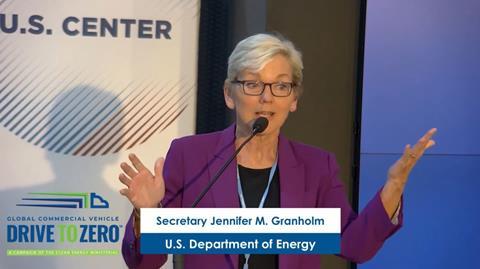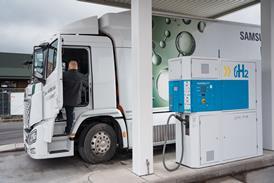The United States used the recent COP27 climate conference to sign up to the the Global Memorandum of Understanding on Zero-Emission Medium- and Heavy-Duty Vehicles (Global MOU), which puts it on a path to 100% new zero-emission medium- and heavy-duty vehicle sales by 2040 at the latest, with an interim goal of at least 30% new sales by 2030.
The US joined Ukraine, Ireland, Aruba, Belgium, Croatia, Curaçao, Dominican Republic, Liechtenstein, and Lithuania as the latest countries to sign the MOU, taking the total number of organisations to 26: “We have to work together across oceans and borders to meet our clean energy goals,” said U.S. Secretary of Energy Jennifer M. Granholm. “This global partnership will leverage the billions of dollars in clean transportation investments provided by President Biden’s Agenda to drive technological innovation, lower vehicle costs, and reduce transportation emissions.”

“The United States sends a powerful message today to the international community that it will work strategically and collaboratively to transition the commercial vehicle sector to zero-emissions. Today’s action will advance zero-emission vehicle manufacturing, boost our economy, and create good paying jobs while reducing greenhouse gas emissions,” said John Boesel, CEO of CALSTART. The Global MOU is co-led by the nation of the Netherlands and CALSTART.
“Currently, Ukraine is going through rough times: we are defending ourselves against Russian military aggression and fighting for the lives of our people. But we are sure that we will win. And we understand the importance of our victory for the entire civilised world. That is why we are ready to sign agreements related to the future of Ukraine and the future of the whole world already now. Our country fully understands and supports important decisions on preserving the ecology of the planet,” said Minister Oleksandr Kubrakov, Minister of Infrastructure for Ukraine. In the midst of fierce fighting and a challenging political landscape, new signatory Ukraine is one of Europe’s largest truck markets. AVERE Ukraine, which is advancing electro mobility in Ukraine, was instrumental in bringing the Global MOU to Eastern Europe.
“As the population of a small and arid island, the inhabitants of Aruba are keenly aware of the impact of climate on our daily lives and our livelihood. But we build our community by dealing with our vulnerabilities and by setting our ambitions high and our standards higher. With this MOU we can continue to build and move forward based on that resolute spirit,” said Minister Ursell Arends, Minister of Transportation, Integrity, Nature & Senior Affairs for Aruba.
“The limited time horizon and the level of ambition needed to decarbonize the European transport sector by 2050 require ambitious policies, on all levels. Belgium is committed to put all its efforts into sustainable, emission free mobility because of the clear benefits for the climate and air quality. At the same time, we are motivated to put the existing production of trucks on a future-oriented track, e.g., with sustainable battery production and job creation in Belgium,” said Minister Zakia Khattabi, Belgium’s Minister for Climate, Environment, Sustainable Development and Green Deal. “We look forward to learning from other countries as part of the MOU and strengthening each other in this challenging transition.”

“For Curaçao, as an island nation in the Caribbean, it is a priority to support these kinds of initiatives. In this way, Curaçao also forms part of international goals in the context of climate change. Making transport more sustainable must also be feasible for an island nation like Curaçao in the Caribbean. It is important to give our children a better world to live in. Curaçao is a small island, but we can be an example for larger countries in the way we deal with these kinds of aspects. We are ready for this challenge!” said Minister Charles Cooper, Minister of Transportation for Curaçao.
“The scale of change needed to meet the 50% reduction in transport emissions and to reach net zero within three decades is beyond compare,” said Minister Eamon Ryan, Ireland’s Minister for Transport and the Environment, Climate and Communications. “Governments must encourage and support the private sector with the right mix of policy and regulatory action to ensure we reach our climate objectives over the next decade.”
“The future belongs to clean and sustainable transport. This is a priority for the Lithuanian Government and we’re on track to reach this goal. Around 70% of the fleet of Lithuanian international freight haulers consists of the least polluting fossil fuel trucks that are currently on the market. Lithuania fully supports the global initiatives of combating climate change that are outlined in this Memorandum of Understanding. The actions planned will aid us in achieving zero-emission transport by 2050. We trust that the industry will contribute in every possible way to the achievement of these goals,“ said Minister Marius Skuodis, Minister of Transport and Communications of the Republic of Lithuania.
There are now 26 countries — including the United Kingdom and Canada — on four continents who have signed the Global MOU (see the complete list here).
Since it first launched, subnational governments from around the world—including California, Québec, and Telangana in India—as well as private sector innovators Scania, DHL, Heineken, Ballard, and Eaton have signed formal acknowledgements endorsing the ambition of the Global MOU. New endorsers announced today include technology company Siemens, Workhorse Group, Commercial Vehicle Charging Europe (a joint venture of Europe’s biggest truck manufacturers, which will build at least 1700 public charge points for heavy-duty vehicles in Europe by 2027), Heliox, Avere, REE Automotive USA Inc., Brightmerge, ParkMyFleet, Phoenix Motorcars, Sono Motors, and Charge Across America.













